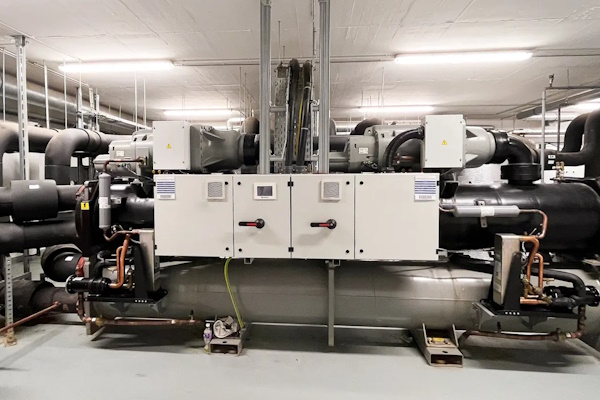Water-to-Water Heat Pumps

Water-to-water heat pumps are among the most efficient and sustainable solutions available for heating and cooling buildings today. Unlike air-source heat pumps, water-to-water systems extract thermal energy from a consistent and relatively stable heat source, such as groundwater, lakes, rivers, or geothermal reservoirs. This consistent source temperature significantly boosts efficiency, particularly in colder climates where air-source heat pumps often struggle.
How Water-to-Water Heat Pumps Work
Water-to-water heat pumps transfer heat through a refrigerant cycle, extracting thermal energy from a natural water source and using it to heat water for residential or commercial heating systems. In cooling mode, this process is reversed, pulling heat from the building and transferring it back into the water source.
Benefits of Water-to-Water Heat Pumps
- High Efficiency: The stable temperature of water sources allows water-to-water heat pumps to operate with higher Coefficient of Performance (COP) values, meaning they provide more heating or cooling output per unit of electricity consumed.
- Lower Energy Costs: Due to their efficiency, these systems can significantly reduce electricity consumption, resulting in lower monthly energy bills.
- Reliability in Cold Climates: Unlike air-source systems, the performance of water-to-water heat pumps is less impacted by external air temperatures, making them ideal for colder regions.
- Longer Lifespan: With fewer moving parts exposed to external conditions, these systems typically require less maintenance and have longer operational lifespans.
Considerations for Installation
While water-to-water heat pumps offer many advantages, their effectiveness depends on the availability and quality of a suitable water source. Considerations include:
- Water Availability: Reliable access to a sufficient water source is crucial. Groundwater wells, lakes, rivers, or geothermal sources must be accessible and abundant.
- Water Quality: High-quality water is preferred to minimize corrosion and scaling within the heat exchange system. Poor water quality can lead to increased maintenance and reduced efficiency.
- Regulatory Compliance: Installation often requires permits and adherence to local environmental regulations regarding water extraction and discharge.
Applications
Water-to-water heat pumps are ideal for various applications, including:
- Residential Heating and Cooling: Providing consistent temperatures for homes, especially in harsh climates.
- Commercial Buildings: Suitable for offices, schools, and industrial facilities that require stable temperature regulation.
- District Heating Systems: Efficiently providing heat to multiple buildings from a central heat source.
Environmental Impact
Water-to-water heat pumps significantly reduce reliance on fossil fuels, helping to lower greenhouse gas emissions. Their high efficiency contributes positively to sustainability efforts, particularly when powered by renewable electricity.
In conclusion, water-to-water heat pumps offer a highly efficient and environmentally friendly solution for heating and cooling, especially suitable in regions with readily available water sources. By carefully considering water availability and quality, along with local regulations, building owners can maximize the benefits of this advanced heating and cooling technology.






